So you want to be initiated into the canon of Coupland, but you're not quite sure where to begin. You want that first time to be special, but you don't want to make a big deal out of it, either. Especially considering that if it doesn't work out, things could get awkward the next time you go into a bookstore and see him there on the shelf. "Oh, is this who you're reading now? What, I wasn't good enough for you?"
It's all about an appropriate entry point. You might want to consider talking to a friend who has already relinquished their Couplinity. (I believe I lost mine to Life After God. Does it make me a horrible person if I can't remember?) Depending on their age and which book they recommend, you'll be treated to one of three things: a commentary on youth cultures past, insight into that pesky new generation you don't quite understand, or a mirror gaze into your very own soul. But be forewarned: fret over the decision too long and you're liable to come down with a bad case of option paralysis. Option paralysis is a term that was coined by Coupland in his debut novel, Generation X, and is defined as the tendency, when given unlimited choices, to make none. So in an effort to aid in your adjudication, I've thrown together a handy list of the man's most defining works. It includes some of my personal favorites, as well as one or two I'm not so fond of, but other people seem to really like.
"Generation X: Tales For An Accelerated Culture"
This is the book that put Coupland on the map and the term "Generation X" on the lips of every finger-wagging baby boomer with a crippling fear of change. It tells the story of three friends who drop out of life proper and relocate to the desert in an attempt to shock some meaning into the system of their lives.
So I came down here, to breathe dust and walk with the dogs-- to look at a rock or a cactus and know that I am the first person to see that cactus and that rock.
The trio take minimum wage "McJobs" that they are incredibly over-qualified for and spend most of their free time getting drunk and telling each other stories. Some come off as benign bits of autobiography, while others serve as apocalyptic parables that just might contain the truth that they've been searching for. It's like a slacker version of The Canterbury Tales, only with less fart humor.
This is as good a place to start as any with Coupland. Generation X quickly established him as an astute cultural critic, even though he wasn't necessarily a member of the group he was defining. He serves up one keen observation after another, smothered in black humor, and please sir, I want some more. Sure, the narrative is loosey-goosey, but that's because that's how the character's lives are being lived. Coupland wisely refrains from giving the directionless direction, choosing instead to let things play out as organically as possible. Despite the co-opting of the title as a marketing buzz word, Generation X is an honest portrayal of the twenty-something malaise, with a biting sense of irony that will have you spinning your own yarns in the pursuit of epiphany.
Get Generation X at Bookshop or Amazon
![]() "Shampoo Planet"
"Shampoo Planet"
After X comes Y. So Coupland followed up his cult debut with Shampoo Planet, a novel about "global teens," or what would later become known as The Y Generation. It is a more focused narrative focused on a more focused generation of kids. Optimistic offspring of hippie parents who reject peace, love and understanding only to embrace the corporate culture of the Reagan era.
Tyler Johnson is a perfect example. He has just returned home to the doldrums of the Pacific Northwest after a Lampoon-less European vacation. His plan is to utilize his newfound worldliness to secure a job with a big-time defense contractor, but daily life in small-town America has other ideas. To make matters worse, he receives a surprise visit from two European friends, one of which was a fling, much to the chagrin of his girlfriend. His best-laid plans get thrown into the spin cycle of life's washing machine, and it looks like somebody forgot to add the fabric softener.
Thematically, Shampoo Planet treads similar ground as Generation X. It wasn't as well received critically, and some were quick to write Coupland off as a one-hit wonder. Coupland himself has said he found the book to be too "contrived."[1] Personally, I prefer to look at it as Accelerated Culture: The Next Generation. Sure, it's an update, and fans of the original might not accept it, but it shows artistic growth, and is a more cohesive piece of work than its predecessor (just not necessarily a better one). Either way, it's definitely worth your read-time.
Get Shampoo Planet at Amazon
![]() "Life After God"
"Life After God"
Don't let the diminutive size of this book fool you, it packs an existential wallop. It is a collection of short stories that center around "the first generation raised without religion," and examines that generation's relationship with faith. Despite the God Is Dead nature of the title, Life After God is not an atheist polemic. It doesn't posit that there is no God; it is a rumination on how we might find our spirituality without him. And for some, it turns out, the answer is: we don't (so don't get all cunty britches, theists).
My secret is that I need God--that I am sick and can no longer make it alone. I need God to help me give, because I no longer seem to be capable of giving; to help me be kind, as I no longer seem capable of kindness; to help me love, as I seem beyond being able to love.
I find it ironic that a book about a generation sans religion should appear so aesthetically similar to a pocket devotional. It's almost as if Coupland is telling us that even without religion, we are prone to religious behavior and ritual. Even the secular baptism of the child on the cover invokes religious connotations.
Not only that, the book can also be read like a devotional. Any time you want, you can open up Life After God and turn to a favorite passage. The one about the father/son road trip to visit Grandad. The one where an elderly man is upset by a news story about Superman being killed off, and what this means for the rest of the world. Or the one about the group of childhood friends and the resentment they feel against their parents for not instilling them with some sort of faith. You can highlight, dog-ear, read and reread these stories, commit them to memory. There is a comfort here in not knowing, and a comfort in knowing you don't know. Sometimes it feels good just to ponder. Lucky for us, this wouldn't be the last time Coupland explored these themes.
Get Life After God at Bookshop or Amazon
![]() "Microserfs"
"Microserfs"
In 1994, Coupland wrote a short story for Wired magazine about the daily life of Microsoft employees. He found the subject so fascinating that he decided to expand upon it, and moved to Silicon Valley to write Microserfs, an incisive account of the then current computer culture. Written in what would come to be know as "blog" format, this prescient novel predicted the dot-com bubble, and even included a precursor of every teenage texter's favorite conveyor of feelings- the emoticon!
The first half of the novel takes place primarily at Microsoft headquarters in Washington state, and takes the form of a journal written by a software tester named Daniel. Daniel documents daily life on his Powerbook computer, which allows Coupland to dabble in some postmodern typographical trickery. (He even manages to sneak in some House of Leaves style ciphers, beating Danielweski to the punch by almost six years.) But formatting flourishes aside, we find ourselves in familiar thematic territory. Coupland gives us yet another group of young people in stasis, then, in what is quickly becoming typical Coupland fashion, he turns the group's lives upside-down with an unexpected event. This time, that event is an offer from a coworker to work on a top secret computer project called, "Oop!"
I had been warned off Microserfs because it was deemed "too tech" by some, but when I finally got around to reading it, it instantly jumped the queue into my favorites. It takes place in such a specific world without feeling dated. It almost reads like a period piece written years after the fact. Anyone who lived through the era or is interested in the history of computer culture is sure to be impressed by Coupland's detailed research. The rest of you, don't worry; Microserfs isn't written to be alienating. As usual, Coupland's characters take center stage, providing the novel's momentum. He forces you to care about the short lifespan of a Microsoft coder, even though the world they live in might seem like science fiction.
Get Microserfs at Bookshop or Amazon
![]() "Girlfriend In A Coma"
"Girlfriend In A Coma"
How's this for a nightmare: your high school sweetheart finally consents to consummating your relationship, and as soon as the deed is done and you are basking in that post-coital bliss, she promptly falls into a coma. Oh yeah, and you just got her pregnant. Congrats, dad!
Think it can't get any worse? Seventeen years later she reawakens, just in time to usher in the end of the world.
Billed as his last novel written as a young person, Girlfriend In A Coma was born out of Coupland's personal battle with depression. It is also named after a song by one of the most depressing bands ever, and yes, it deals with some pretty heavy subject matter (such as girlfriends in comas and the end of the world). But that doesn't prevent the book from being one of Coupland's most optimistic (which probably explains why I didn't like it very much).
So why is it on this list? Because everyone else and their mother seems to love it. It received rave reviews upon its release and was praised as Coupland coming into his own, but I just couldn't get on board. I was turned off by the mystical feel-goodery of the It's A Wonderful Life style ending. I prefer when Coupland hides his hope behind a wall of cynicism, as opposed to wearing it on his sleeve. Still, I acknowledge that this is an important book in Coupland's career, whether I like it or not.
Get Girlfriend in A Coma at Bookshop or Amazon
![]() "Hey Nostradamus!"
"Hey Nostradamus!"
So where do you start when you want to start your life again?
Five years after my least favorite Coupland novel came what many consider to be the man's best: Hey Nostradamus! (Punctuation dictates you actually shout the title.)
Hey Nostradamus! is the story of a fictional high school shooting as told from the POV of four different characters in four different time periods. It focuses less on the actual tragedy and more on the victims of said tragedy, and the ripple effect it has on their lives.
If you don't want to start at the beginning of Coupland's bibliography, or with a very period specific novel like Microserfs, I highly recommend this be your introduction to the man. It eschews the tech-heavy slant and outright silliness of some of his other work, delivering a thoughtful narrative full of emotional depth that lacks the pretensions of something like Girlfriend In A Coma. Coupland uses the massacre as a jumping-off point and proceeds to round up the usual thematic suspects- love, death, belief in God, the meaning of life- without descending into mawkish sentimentality. I hesitate to reveal the cracks in my macho facade, but Hey Nostradamus! is one of the most un-ironic, non-manipulative and poignant novels I have ever read.
Get Hey, Nostradamus at Amazon
![]() "JPod"
"JPod"
In 2006, Coupland updated Microserfs for the digital age with JPod, a book about a group of videogame programmers whose last names all begin with the letter J. They spend most of their waking hours in their pod, working on a skateboarding game which is about to be sabotaged by a cuddly turtle mascot and an insecure superior going through a divorce. When they are not in the office, they are dealing with dysfunctional families, drug dealers, and an empathetic Asian crime boss.
Yes, this is Coupland being silly again, and for the most part, it works. The Podsters are a ton of fun, despite all being borderline autistic, and their likability goes a long way towards balancing out the situational comedy. You don't have to read Microserfs first, but the pair make a great double feature and perfectly illustrate how adroit a zeitgeist chaser Coupland can be. The book was even adapted into a short-lived Canadian television series starring the one and only Alan Thicke! So go ahead and add Jpod to the list of Coupland satires that are razor sharp and funny as shit.
Get JPod at Amazon
![]() "Generation A"
"Generation A"
Since this column is already late and my eyes are about to fall out of my head, I am going to once again plagiarize myself. From my original REVIEW of Generation A:
Much in the way he updated Mircroserfs for the internet age with JPod, Coupland updates the plight of the disassociated twenty-something with Generation A. Resetting the alphabet back to A (with a little posthumous help from Kurt Vonnegut) Coupland weaves a tale of the near future in which bees are extinct and broadcasting your story to the world only serves to make you less unique.
Five total strangers become instant media sensations when they are stung by bees, but not before being whisked away and sequestered from the rest of humanity. Upon their release, they find the world a very different place, and are soon reunited on a remote island to tell each other stories. Not their life stories, which have already been documented, but stories of original origin, which bring them closer together, shedding light on recent events.
If Generation X was about storytelling as an assertion of individuality, Generation A is about storytelling as shared experience. Coupland makes a plea for the printed word, threatened by the hive mind of the internet, a place where the fine art of the story has been replaced by collage. The instant gratification of cyber celebrity is the ultimate distraction, sounding the death knell of the novel in favor of easily digestible chunks of information masquerading as art. It may sound like Coupland is a crotchety old man, railing against what is new and different, but he’s not. He is very much a part of the internet age, and desperately wants novels and the internet to coexist.
This is a seriously funny book. Funny and smart. Coupland has always had a knack for social commentary, but this one is just effortless. The older he gets, the more it seems Coupland has a finger on the pulse of the current generation. He has been on a roll with his last few books, and Generation A is yet another success. Coupland’s satire has had a tendency to border on silly in the past (All Families Are Psychotic) and he walks a fine line here, but manages to maintain his balance.
Get Generation A at Bookshop or Amazon
And that rounds things out nicely, bringing us full circle all the way from X to A. As with any list, this one is completely subjective, so feel free to take me to task. What's your favorite Coupland novel? And which would you recommend as the ideal starting point for noobs?
[1] Close To The Edge, Andrew Anthony

About the author
Joshua Chaplinsky is the Managing Editor of LitReactor. He is the author of The Paradox Twins (CLASH Books), the story collection Whispers in the Ear of A Dreaming Ape, and the parody Kanye West—Reanimator. His short fiction has been published by Vice, Vol. 1 Brooklyn, Thuglit, Severed Press, Perpetual Motion Machine Publishing, Broken River Books, and more. Follow him on Twitter and Instagram at @jaceycockrobin. More info at joshuachaplinsky.com and unravelingtheparadox.com.
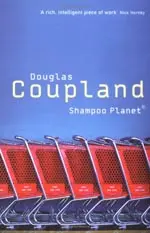 "Shampoo Planet"
"Shampoo Planet"
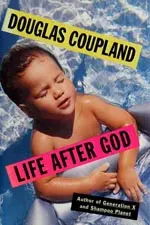 "Life After God"
"Life After God"
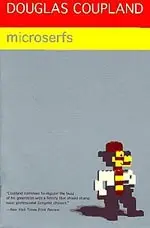 "Microserfs"
"Microserfs"
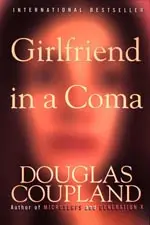 "Girlfriend In A Coma"
"Girlfriend In A Coma"
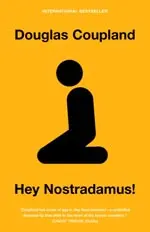 "Hey Nostradamus!"
"Hey Nostradamus!"
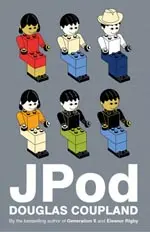 "JPod"
"JPod"
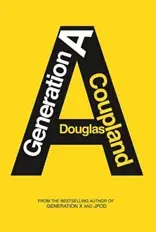 "Generation A"
"Generation A"







